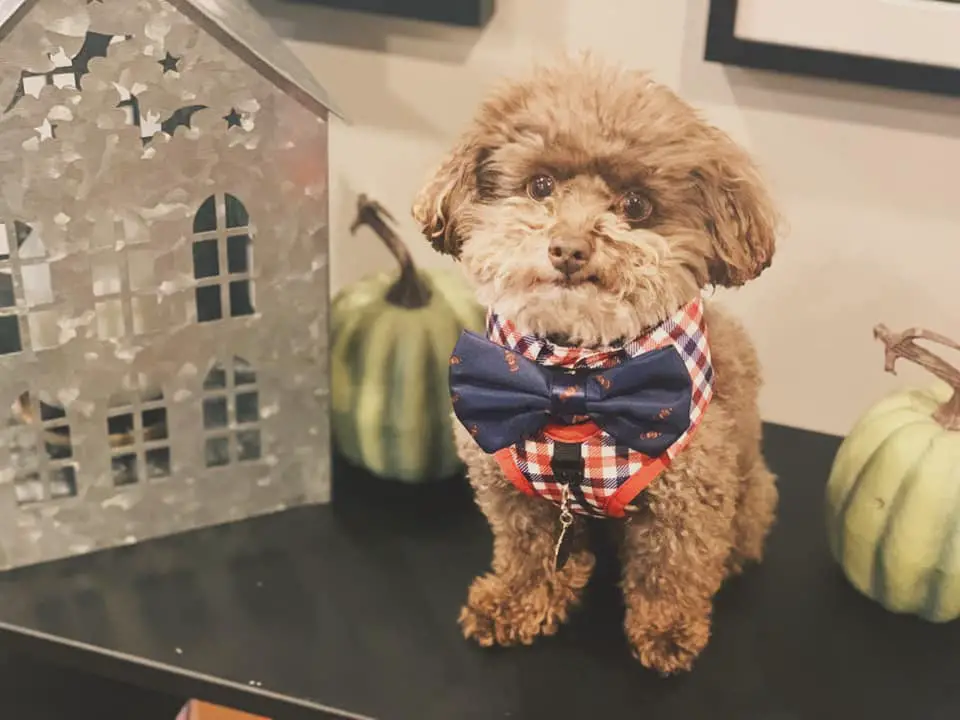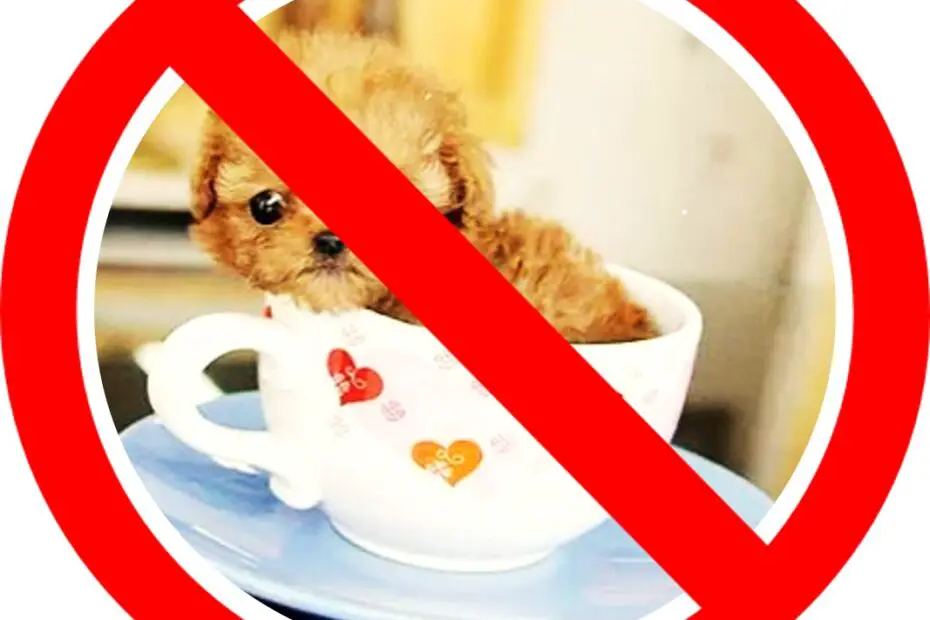Last updated on February 24th, 2021 at 09:33 pm
Are you thinking of getting a teacup poodle? Is the toy poodle too big for you ( according to the American Kennel Association, the toy poodle is the smallest legit poodle size)? Does the small size of the teacup poodle appeal to you?
Well, beware of breeders who claim to have poodle puppies that are of teacup poodle size, as these puppies can have many genetic and health problems. Breeders may advertise their puppies using the following terms:
- teacup poodles
- micro-poodles
- pocket poodles
In fact, many toy poodle breeders in recent years have claimed to have poodles that will be four pounds or less as adults. But know that an ethical breeder will always breed for health and temperament, not for a size that is smaller than the breed standard for a toy poodle. This doesn’t mean that all toy poodles on the small side are poorly bred, but it does mean that you should be wary of breeders whose main selling point is the extra small size of their toy poodle puppies.
Although teacup poodles come in small convenient sizes, Teacup poodles are prone to a lot of health problems. Breeders who advertise teacup, micro-teacup, and pocket poodles may be compromising health and temperament for size. Teacup poodles are not good pets.
On the other hand, toy poodles make great pets, and they come in small sizes too, but without the problems typical of teacup poodles. We recommend that you get a toy poodle if you want a small-sized poodle.
In ethical poodle breeding, there may be an occasional puppy who stays smaller than the rest, but ethical breeders will not make it a goal to breed puppies that are smaller than AKC standard for a toy poodle. Ethical American breeders aim to keep the to the American Kennel Club description of the breed. Likewise, ethical breeders in other countries will also try to make sure that they are breeding according to the size and standard determined by their country’s kennel club description. Breeders who advertise teacup, micro-teacup, and pocket poodles may be compromising health and temperament for size.
Teacup poodle breeders instead of breeding the best specimens of the toy poodle, they will breed the smallest. This means they will often ignore the health and temperament of the breeding pair and instead breed together two parent dogs that are most likely to produce puppies that are smaller than a typical toy poodle.
People are often interested in owning these tiny teacup dogs because they imagine it would be like owning a forever puppy. They are not usually aware of the potential health and temperament problems that would arise in a puppy that is not well-bred.
For example, puppies who are bred to be too small could end up with structural abnormalities. It is common for small breeds like the teacup poodle to suffer from a luxating patella. If your puppy is bred too small, his elbows could have this deformity that can cause him pain when he walks. Severe cases of luxating patella result in the puppy needing expensive surgery.
Other genetic diseases and health problems that arise in these tiny poodle puppies that have been improperly bred too small include:
- Arthritis: Arthritis can develop in the extra small breeds because their bone structures can be inept for their size and weight. Normal wear and tear can normally cause arthritis in dogs when they are old, but the small bones and ligaments of these extra small breeds can lead to arthritis at an early age.
- Intervertebral Disc Disease: Intervertebral disc disease is another genetic deformity that can occur when dogs are bred down in size too quickly. This disease causes the vertebrae to have an arched look. It can be painful.
- Hip Dysplasia: Hip dysplasia is most common in large breed dogs, but it can also occur in dogs that have been bred down in size too quickly. Dogs with hip dysplasia require extensive surgery to function.
- Hypoglycemia: Hypoglycemia is a medical condition where a toy poodle has low blood sugar. It is common in extra tiny breeds simply because these breeds cannot eat enough in one sitting to keep their blood sugars at normal levels.
- Dehydration: Dehydration is more common in extra tiny breeds for the same reason hypoglycemia is common. Super tiny poodles cannot drink very much water at once, so they need to be offered water many times a day to avoid dehydration, especially in the summer. If no one has the time to be giving them water every now and then, these tiny poodles will suffer from dehydration.
Practical Issues with Teacup-Sized Puppies
Besides the genetic and health issues with micro-teacup or pocket poodles, there are also some practical reasons not to own a puppy bred smaller than it should be. For one thing, when a puppy is bred to be too small, the bones can be more fragile than they should be. Some of these tiny breed poodles can break bones just from jumping off of a sofa.
Extra tiny poodles can also be very difficult to house train. If they are bred to be too small, the puppies will not have bladders big enough to hold their urine for long enough to wait to be taken outside. If their owners work outside of the home, this can make it very difficult both for the tiny poodle and for the owner. House training can be nearly impossible for a puppy that has been bred so small that he has to go potty every half hour. For most owners, that is not compatible with their lifestyle. They may like the idea of a dog that looks like a puppy for all of its life, but they don’t always realize how difficult it can be to house-train a puppy this size.
Micro-poodles and other smaller than toy poodles will also require multiple tiny meals per day. They will need water with each meal.
Some breeders of these tiny poodles will argue that all poodles were once bred down in size. While that may be true, when the original toy poodle was bred down from larger sizes, it was done over many generations. It was done carefully, not compromising health or temperament. When the toy poodle was first classified as its size and breed, it was already well established.
Generations of careful and slow breeding down in size had made sure that the toy poodle was not too small to function normally as a pet dog. Many of the teacup poodles, micro-poodles, and pocket poodles were not bred down in size carefully. They were bred down quickly to meet the demand for extra small dogs. This quick and careless breeding for size is what has caused so many problems in these tiny poodle puppies.
Final Thoughts

Instead of owning a teacup poodle, consider owning a toy poodle. A toy poodle that is bred to breed standard will be a much better pet than any of the extra tiny teacup poodle puppies. An ethical breeder who is breeding for health and temperament rather than size will produce toy poodle puppies that are the right size for the breed. These puppies will have a stable temperament. They will be healthy. Their bones will be strong. They can hold their urine for a few hours at a time. They will be able to eat enough in one sitting to keep them from becoming hypoglycemic or dehydrated too quickly. Toy poodles bred to the appropriate size will be a much better pet than puppies such as teacup poodles that have been bred too small.
If you want a small poodle, get a toy poodle.

